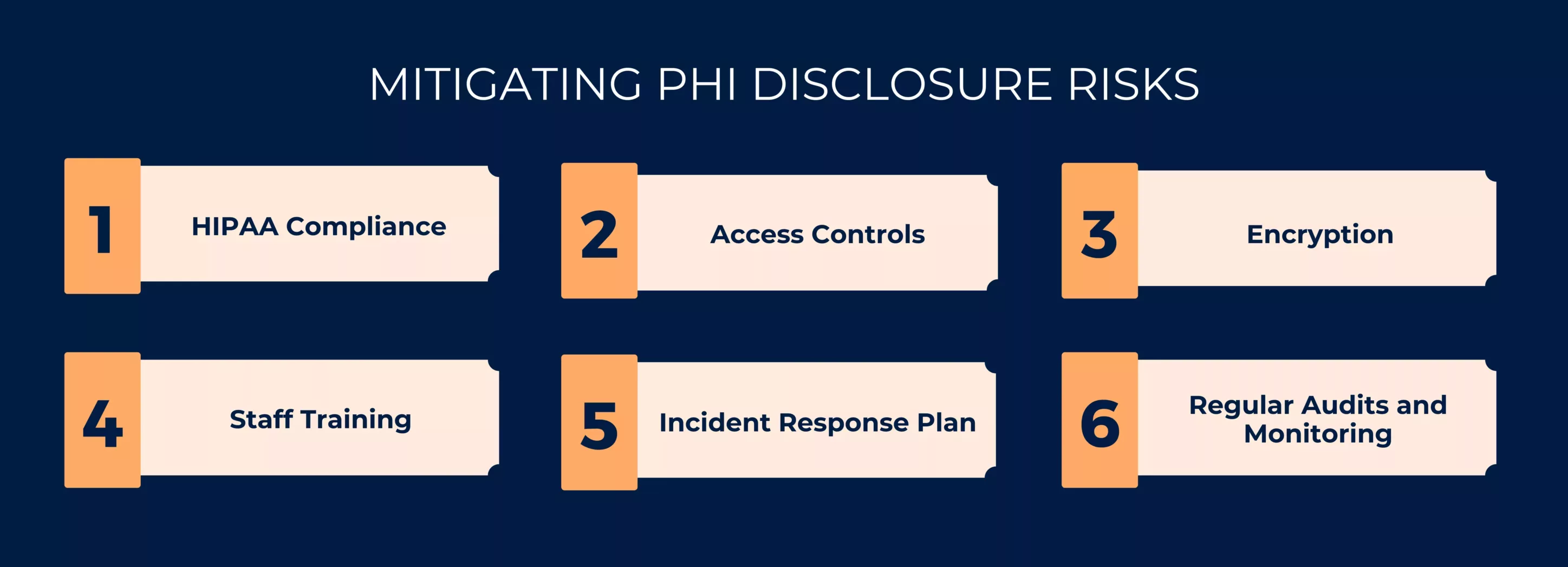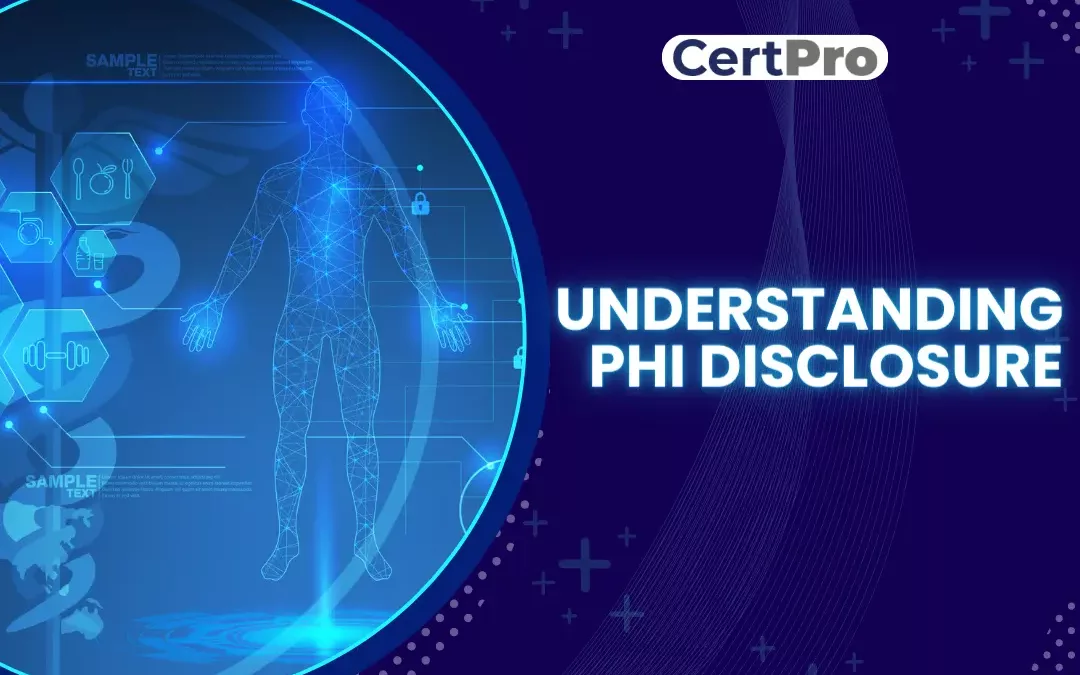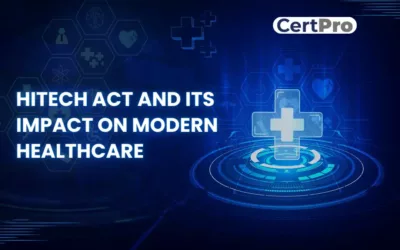Protecting the integrity of patient privacy and the security of their health information stands as a vital concern in an era where digital healthcare systems seamlessly connect patients, providers, and insurance. PHI disclosure, a complicated web of laws, customs, and ethical considerations, is at the center of this difficult terrain, which is what this article will go into great detail about. PHI, which includes a person’s most private medical records, billing information, insurance information, and private communications with healthcare providers, is the lifeblood of healthcare data.
We will explore the complex world of HIPAA PHI disclosure and dissect the laws that support it, paying particular attention to the Health Insurance Portability and Accountability Act (HIPAA). In order to give healthcare professionals, organizations, and patients alike vital knowledge, this article seeks to provide a thorough overview of Protected health information disclosure.
In the end, it emphasizes how crucial it is to handle PHI responsibly in order to maintain patient trust, protect data security, and uphold the integrity of the healthcare system.
KNOW PHI DISCLOSURE
Protected health information (PHI), which includes a wide range of private health-related data, is a crucial concept in contemporary healthcare. Individually identifiable health information, or PHI, can be used to link an individual to specifics about their medical history, current or past treatments, or financial arrangements for healthcare services. This data comprises not only conventional medical records but also any information pertaining to a person’s health state, access to healthcare, or availability of health insurance.
Name, address, date of diagnosis, social security number, medical record number, and any other identifying information when connected to health data are examples of HIPAA PHI Disclosure. PHI also includes information on medical diagnoses, treatments, prescriptions, test findings, and even conversations between patients and healthcare professionals.
PHI DISCLOSURE BENEFITS
HIPAA Personal Health Information Disclosure is crucial to the healthcare sector and has many advantages that go well beyond the obvious. Here are a few significant benefits:
1. Patient-Centered Care: Healthcare practitioners can quickly obtain vital patient information because of HIPAA PHI Disclosure. Patient outcomes are enhanced as a result of more individualized and prompt care. Physicians are able to make well-informed choices, prescribe precise therapies, and steer clear of probable negative outcomes.
2. Enhanced Collaboration: Sharing PHI makes it easier for healthcare providers to work together effectively. Specialists, nurses, and other members of the care team can access the patient’s medical history, ensuring coordinated care and minimizing redundant tests or procedures.
3. Efficient Healthcare Delivery: Personal Health Information Disclosure speeds up patient record access, streamlining administrative procedures. This effectiveness frees up time, lessens the stress of administrative tasks, and enables healthcare professionals to concentrate more on patient care.
4. Research Advancements: De-identified PHI data are available to researchers for use in studies and clinical trials. This results in the expansion of medical knowledge, the creation of novel therapies, and improved healthcare procedures.
5. Healthcare Analytics: PHI sharing encourages data analytics, which helps spot patterns and trends in public health. Health care policies, budget allocation, and disease prevention tactics can all benefit from this information.
TYPES OF PHI DISCLOSURE
Within the healthcare system, protected health information (PHI) may be disclosed in a number of ways, each of which serves a particular function and complies with stringent privacy and security regulations. The following PHI examples are essential for patient care, healthcare operations, and making sure the healthcare sector is running smoothly:
1. Treatment Disclosure: This type of PHI example involves the sharing of patient information among healthcare providers directly involved in a patient’s care. For example, a primary care physician may share a patient’s medical history, diagnoses, and treatment plan with a specialist for consultation or referral.
2. Payment Disclosure: PHI must be shared between healthcare providers for billing and reimbursement reasons. To accurately process claims, this also entails sharing information with health insurance providers. Payment disclosures frequently include information on the price of the services provided as well as diagnosis and procedure codes.
3. Healthcare Operations Disclosure: PHI can be shared to help healthcare organizations operate efficiently. This can entail utilizing patient data for staff training, quality improvement projects, internal audits, or ensuring compliance with healthcare regulations.
4. Public Health Reporting: Some PHI examples to public health authorities are allowed in order to safeguard the public’s health. For instance, reporting communicable diseases, outbreaks, and other health-related problems to public health organizations can help them efficiently monitor and respond to health concerns.
5. Research: For the purpose of conducting medical research and clinical trials, PHI may be disclosed to researchers, but only after careful de-identification to safeguard patient privacy. Research disclosures are essential for expanding medical understanding and improving healthcare procedures.
6. De-Identified PHI: Information can be shared more freely for research, public health, and other purposes when it has been stripped of identifiers that could link it to a specific person. The data can be used without compromising patient privacy thanks to de-identification.
CONSEQUENCES OF IMPROPER HIPAA PERSONAL HEALTH INFORMATION DISCLOSURE
PHI violations can have negative legal and ethical repercussions, cause serious harm to people, and tarnish an organization’s reputation. The following are some major effects of inappropriate Personal Health Information Disclosure:
1. Legal Penalties: Significant legal fines may be imposed for breaking regulations like the Health Insurance Portability and Accountability Act (HIPAA). Depending on the seriousness of the violation, these sanctions may also include civil fines, which can run from thousands to millions of dollars. Criminal charges that result in fines and/or imprisonment for the breach’s perpetrators may be brought in some circumstances.
2. Loss of Trust: Patients have faith that medical personnel will maintain the confidentiality and security of their medical records. When that confidence is lost, patients can be less reluctant to divulge important medical information, seek required treatment, or communicate honestly with their medical professionals.
3. Reputational Damage: Healthcare organizations that experience PHI breaches often suffer significant reputational damage. News of a breach can spread quickly, causing public outcry and damaging an organization’s standing in the community. This reputational harm can be long-lasting.
4. Legal Liability: PHI holders who believe their information has been unlawfully exposed may file a lawsuit against the offending healthcare provider or company. Legal actions may lead to monetary settlements or judgments against the offending party.
5. Operational Disruption: Resources and attention may be diverted away from patient care as a result of this operational interruption.
6. Financial Consequences: PHI breaches can lead to considerable financial losses in addition to fines and court costs. These can include expenses for informing affected parties, offering credit monitoring services, and prospective company losses.
MITIGATING PHI DISCLOSURE RISKS
Mitigating PHI (Protected Health Information) disclosure risks is paramount in healthcare to ensure the confidentiality, integrity, and security of patient data. Here are key strategies for mitigating HIPAA PHI disclosure risks:
HIPAA Compliance: The Health Insurance Portability and Accountability Act (HIPAA) must be followed strictly. To maintain compliance, personnel must get regular training and updates.
Access Controls: Implement strict access restrictions to provide authorized personnel only limited access to PHI. Strong password rules and role-based access are essential. As staff positions change, periodically evaluate and adjust access rights.
Encryption: It is essential to have training programs that go over every facet of PHI security, HIPAA compliance, and best practices. Employees must understand the risks of sharing PHI and the need to maintain patient privacy.
Staff Training: Training programs that cover all aspects of PHI protection, HIPAA compliance, and best practices are crucial. Employees need to be aware of the dangers of disclosing PHI and the significance of protecting patient privacy.
Incident Response Plan: Create a thorough incident response strategy that outlines what you will do in the event of a PHI breach. Procedures for breach detection, containment, notification, and recovery should be included in this plan.
Regular Audits and Monitoring: PHI systems should undergo routine security audits and monitoring to look for any vulnerabilities or unusual activity. Breach prevention is possible with the prompt discovery of security vulnerabilities.

FAQ
What is PHI, and why is it important?
Protected health information is referred to as PHI. It contains private health information that, when connected to a specific person, needs to be protected to maintain privacy. It’s important since it contains private medical information that may have an influence on someone’s healthcare and right to privacy.
What laws regulate PHI disclosure?
The Health Insurance Portability and Accountability Act (HIPAA) is the main piece of legislation in the United States that regulates PHI. The Privacy Rule, Security Rule, and Breach Notification Rule are all part of HIPAA and provide criteria for protecting PHI.
When can PHI be disclosed without patient authorization?
Without the patient’s permission, PHI may be disclosed for purposes related to treatment, payment, and healthcare operations (TPO). It may also be shared for law enforcement, specific research projects, and public health reporting, in addition to other specific circumstances outlined under HIPAA.
What are the consequences of improper Personal Health Information disclosure?
Inappropriate Personal Health Information disclosure can result in fines, a decrease in patient trust, harm to an organization’s reputation, financial consequences, and operational disruption.
How can individuals protect their own PHI?
Individuals can protect their PHI by being vigilant about sharing health information, using strong passwords for healthcare portals, and regularly reviewing their medical records for accuracy. They should also report any suspicious activities involving their PHI to healthcare providers.

About the Author
GANESH S
Ganesh S, an expert in writing content on compliance, auditing, and cybersecurity, holds a Bachelor of Arts (BA) in Journalism and Mass Communication. With a keen eye for detail and a knack for clear communication, Ganesh excels in producing informative and engaging content in the fields of compliance, auditing, and cybersecurity, with particular expertise in ISO 27001, GDPR, SOC 2, HIPAA, and CE Mark.
HITECH ACT AND ITS IMPACT ON MODERN HEALTHCARE
In 2009, the Health Information Technology for Economic and Clinical Health or HITECH Act was signed to transform the American healthcare industry. The laws worked as a forward-thinking process of changing patient services. In this regard, the Patient Protection and...
BEST PRACTICES FOR DATA PROTECTION IN THE HEALTHCARE INDUSTRIES
In the healthcare sector, safeguarding sensitive information about patients is extremely important. Patient data includes personal details, medical histories, and treatment plans. Therefore, it must be protected and should be confidential. Thus, breaches not only...
HIPAA CONSULTANTS: WE KNOW HOW TO SECURE YOUR INFORMATION
Navigating HIPAA compliance can be complex; therefore, organizations seek advice from HIPAA consultants. These HIPAA experts have specific knowledge. They can help firms to understand the problematic standards of the Healthcare Privacy Act. In 1996, HIPAA was created....




